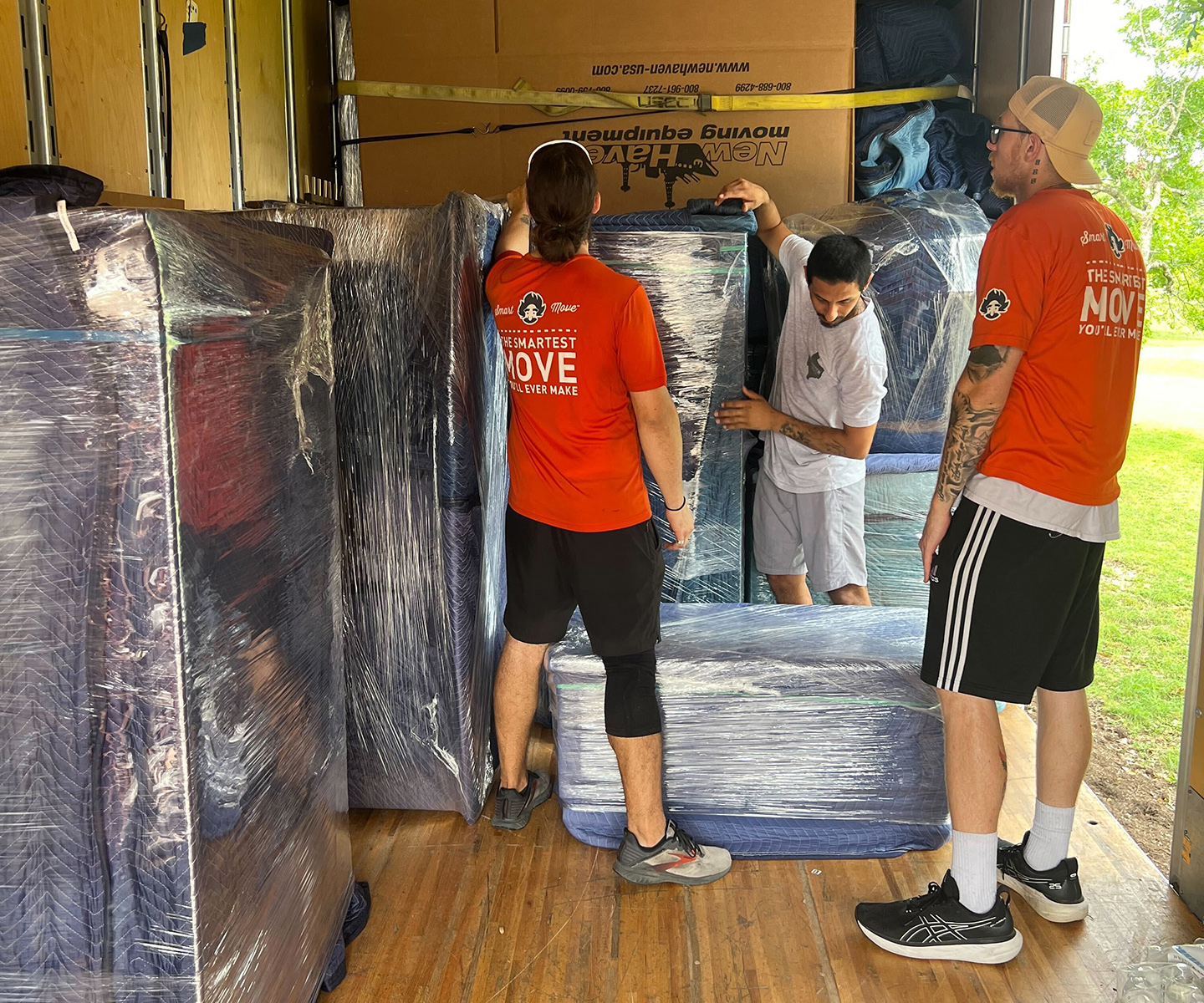🎓 Have you recently graduated from college or university?
🏡 Are you unsure whether or not you want to move out or move back home?
📦 Are you wanting more privacy after living in a cramped dorm or apartment?
While living at home has its benefits like saving money on rent, home cooked meals, and extra support, you may be feeling like it’s time to go out on your own. Living at home means you’re living under someone else’s roof — which also means their rules.
Am I ready to move out on my own?
If you’re asking yourself this question, chances are, part of you already feels ready. We’ve put together a few considerations that will help you know if it’s time to leave the nest:
You’re still dependent on your family’s schedule or curfew.
Sometimes parents have strict curfews to adhere to — usually they’re to keep you safe — but, sometimes it can feel like too much control.
Whether you’re required to be home by a certain time at night or you’re responsible for preparing dinner for others every evening. Staying on your parent’s schedule can make you feel like less of an adult.
If you find yourself constantly frustrated by having to navigate around your parents’ routines, it might be time for a change. Moving out gives you the chance to set your own schedule and manage your time however you want—whether that’s staying out late with friends or binge-watching your favorite show in peace.
You’re looking for reasons not to spend time at home because you feel suffocated or overwhelmed.
Does staying out late with friends or finding excuses to stay elsewhere sound more appealing than being home? Living at home can be comforting, but if you feel like your personal space is constantly invaded or you’re walking on eggshells around family members, it might be time to rethink your living situation.
Here are some telltale signs:
- You’re easily annoyed or frustrated by family members’ habits (even the harmless ones seem to get on your nerves).
- You can’t find a quiet place to study, work, or just relax without interruptions.
- You’re craving independence and privacy more than ever before.
If any of these resonate, it’s a clear signal you might be ready for a change.
You’re no longer saving money as your parents are charging you rent.
Living at home can save money, but not if your parents are charging you rent, groceries, and that family Netflix account. If your expenses at home are close to what you’d spend living independently (or with roommates), it’s probably time to find your own place.
Compare your current expenses to what you’d pay living on your own. If there’s little difference—or if living at home is starting to feel like a strain—it might make sense to move out and have full control of your finances.
You avoid inviting people over — impacting your dating life!
Inviting friends or a date over to your parents’ house can feel awkward. If you’re constantly dodging social plans because you don’t want to deal with family interruptions or feel embarrassed about the lack of privacy, it’s probably time to consider moving out.
Your own space means you can:
- 🎲 Host game nights without worrying about noise levels.
- 🍳 Cook a romantic dinner without the risk of “family interruptions.”
- ☺️ Simply enjoy being yourself without explaining your every move.
- 🚫 Avoid “meeting the parents” on the first date.
You’re not learning basic life skills like cooking, cleaning, or laundry.
While it might feel awesome to have your laundry, dishes, and cooking done for you — maybe as far as someone else taking your vehicle for oil changes — these are key skills to be learning and doing yourself if you want to be on your own in life.
Remember, your parents can’t be around for you forever, and some of us (we can’t lie) need a bit of a push to do things on our own. Moving out might be a great opportunity to build on those skills and take the next steps at being more of an adult.
You’re not building credit because you haven’t had to pay any bills.
Living at home often means fewer bills and shared expenses, which is great for saving but doesn’t help you build credit. Good credit is essential for things like renting an apartment, buying a car, or even qualifying for a mortgage someday.
Even if you’re not ready to move out just yet, building credit now will set you up for financial independence when you are. It’s one of the most underrated but vital steps in preparing to leave the nest.
Do I have enough money to move out on my own?
If you’re feeling absolutely confident that you’re ready to move out, you need to make sure you can! Not everyone has a savings account ready to go, and depending on your circumstances (like student loans or a new job), your financial situation might look different from others.

To find out whether or not you have enough money saved up to move out, you need to make sure you can cover the costs of moving out and living on your own—or with roommates. A good rule of thumb is that:
- Your income should be 3x what you spend on rent.
OR
- Your rent should be 30% or less of your net income.
The rest of your income should be used for other expenses and savings. We’ve included some helpful tips below to help you with budgeting and managing your expenses.
Budgeting 101: Expenses To Account For When Moving Out
Here’s a breakdown of the main expenses to factor into your budget:
- 🏡 Rent: Keep it at 30% or less of your net income.
- 💡 Utilities: Electricity, gas, water, and internet add up quickly.
- 🍎 Groceries: Plan for weekly trips to stock up on essentials.
- 🚌 Transportation: Whether it’s gas, car payments, or public transit, don’t forget to factor in how you’ll get around.
- 💰 Savings: Aim to have 3–6 months’ worth of living expenses saved before you move out.
Helpful Tip: Use budgeting apps or create a monthly spreadsheet to track your spending and stay on top of bills.
How much savings should I have to feel comfortable moving out?
Moving out for the first time is exciting, but having enough savings is key to making the transition smooth and stress-free. While the exact amount can vary depending on your situation, a general rule of thumb is to have 3–6 months’ worth of living expenses saved up before taking the leap.
Why 3–6 Months of Savings?
This cushion ensures you can handle unexpected challenges while covering your day-to-day costs, giving you financial breathing room as you settle into independent living. Here’s why it’s important:
- Emergency Expenses: Life is unpredictable. Your car might break down, your laptop might decide to retire early, or you might need to pay a surprise medical bill. A solid savings buffer helps you handle these moments without panic.
- Job Stability: If you’re transitioning jobs or just starting out, having savings ensures you can cover your bills while you get on your feet.
- Peace of Mind: Living on your own comes with a learning curve. Knowing you have financial security lets you focus on enjoying your new independence instead of stressing over money.
Job & Other Employment Considerations When Moving Out
Let’s be real unless you’ve hit the lottery or have a magical money tree, moving out on your own means having a steady job. You’ve gotta pay for rent, groceries, and, of course, that late-night pizza delivery after a long day of adulting. So, before you make the big move, let’s talk about how your job fits into the picture.
If you work from home, you’ll need a strong internet connection and a quiet space for calls or focused work. This might mean prioritizing a private room or even a larger place, which can add to your rent. Got roommates? Consider how your work schedule will impact shared spaces. A remote worker might need more quiet time, which could require setting boundaries for noise or coordinating schedules.
If your job isn’t remote and you need to commute, think about how far you’re willing to travel every day. A shorter commute might mean spending more on rent to live closer, while a longer one could save you money but cost you extra in gas or transit fares.
You’ll want to feel confident at your current job and continue building on your skills so that you can maintain income.
Choosing The Ideal Place To Move Into
Where you live can make or break your experience. Here are some things to consider:
- 📌 Location: Close to work, school, or places you frequent to save time and money.
- ♥️ Safety: Check crime rates and visit the area at different times of day.
- 🗺️ Proximity: Consider access to family, friends, and essential amenities like grocery stores and gyms.
- 🏢 Type of Dwelling: Decide if you need a studio, one-bedroom, or more space based on your lifestyle.
- 🚗 Parking: If you drive, confirm parking availability and costs.
- 🏪 Amenities: Look for extras like laundry facilities, a gym, or pet-friendly spaces if they matter to you.

Do I need a roommate?
Knowing whether or not you need a roommate will depend on whether or not you need the financial support to pay for rent (which no shame, many of us do! It’s nice to have someone else to provide support for maintenance and chores. Another benefit to having a roommate is the added feeling of security — it’s nice to know you’re not always coming home to an empty space.
However, here are some things to consider if you need a roommate:
- There is a lack of privacy with shared spaces — and it’s not always easy navigating these spaces with people who aren’t your family.
- The need to set clear boundaries for schedules and chores — there’s nothing worse than feeling like you’re the only one cleaning the toilets!
- Keeping your things safe and in good conditions — it might be your sofa used in your shared living room, and it’s okay to not want someone spilling a glass of red wine on your white cushions.
💡 If you choose a roommate, have a clear agreement on schedules, chores, and boundaries to avoid misunderstandings.
Ready to take the leap and move out on your own?
If you’re ready to take your first step of independence and need a hand with the heavy lifting, get a free quote from us today!
Book Your Move

